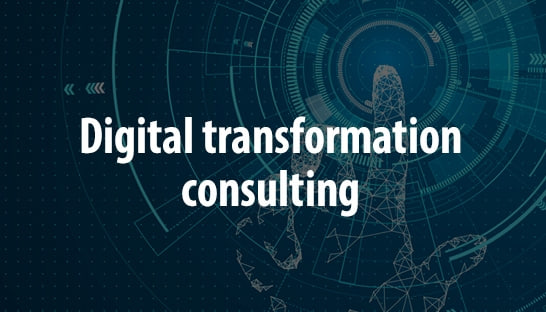The Ultimate Guide to Digital Transformation Consulting
Recent research indicates that the COVID-19 pandemic has significantly accelerated the adoption of digital technologies, prompting organizations across various sectors to enhance their digital transformation initiatives.
Today, most consumers prefer to engage in transactions, learn, and resolve issues online. While in-person interactions were once the norm, most clients now seek digital solutions.
Therefore, organizations of all sizes must adapt to this shift to ensure their success by implementing digital transformation strategies that align with contemporary user experience trends.
This article presents the ultimate guide for establishing a digital transformation methodology within companies and outlines the advantages of collaborating with consultants or digital transformation service providers to facilitate technology integration throughout their operations.
Understanding Digital Transformation
Digital transformation entails reconfiguring a company's operational frameworks to thrive in the digital era by leveraging digital technologies, software, and platforms. This approach aims to develop new, streamlined products or services while enhancing existing processes to increase business value and improve client experiences.
Successful digital transformation requires focusing on data analytics and implementing customized digital strategies that address evolving market demands, which can vary significantly between organizations.
What is Digital Transformation Consulting?
Many companies and executives in large organizations are unprepared to transition into the post-COVID era. Outdated ideas, isolated organizational structures, and ignorance of the evolving business environment constrain them.
Digital transformation consultants help these organizations and executives navigate the digital transformation challenges. This includes planning and managing the entire change management process and guiding teams and employees in adopting new digital platforms, workflows, and processes that enhance corporate profitability over the long term.
So, companies can improve their digital transformation by collaborating with expert consultants. Digital transformation consultants develop cohesive strategies to maximize business value by working alongside IT managers and information systems departments. It is important to note that healthcare digital transformation strategies differ from those required in financial services.

How Companies Benefit from Digital Transformation Consulting Services?
Companies benefit from engaging digital transformation consultants to navigate changes, which involves adopting automation tools, applications, and workflows to improve efficiency and client experience.
Companies typically pursue digitization to improve their operations in two primary ways:
- Improving Core Processes: This digital transformation aspect focuses on reengineering core business processes and legacy systems to become more agile, efficient, and client-centric.
- Creating New Businesses, Products, or Services: Digital transformation emphasizes expanding business offerings to meet client
Digital transformation consulting providers may initially prioritize the following:
- Leveraging emerging technologies.
- Leveraging data and AI effectively.
- Modernizing legacy systems
- Streamlining and automating processes.
- Enhancing digital growth.
- Creating effective digital experiences.
- Promoting talent and culture in the digital space.
It depends on the organization's current deficiencies and the areas where it can provide the greatest value to its clients. For example, a traditional banking institution may benefit significantly from leveraging data and AI, and modernizing legacy systems, prompting consultants to concentrate on these elements.
Conversely, a retailer might prioritize creating engaging digital experiences and automating operational processes.
Additionally, digital transformation consulting services can enhance various business operations, including:
1. Business Processes
Digital transformation strategies focus on delivering more value and customer satisfaction. This could involve developing a seamless multi-channel client experience, digital marketing strategies, personalized pricing, or sales digitization.
2. Operational Processes
These processes focus on refining the company’s operational methodologies to boost efficiency. Depending on the business operations, this may involve optimizing supply chain management, procurement, claims processing, medical management, productivity enhancements, and more.
3. Back Office Processes
Digital transformation efforts in this area are centered on automating routine administrative tasks. This may include automating manual workflows, managing human resources, or improving other internal functions.
Assessing the Need for a Digital Transformation Strategy
First, consider whether the company can maintain its economic viability during this digitization period and beyond. According to a McKinsey report, 92% of companies doubt their business models' long-term viability during this transition.
After addressing this critical question, identify the opportunities and gaps that digital transformation consulting can address within the organization. Here are some reference questions to evaluate your organization's readiness for digital transformation:
- Does the organization have a technology roadmap linked to its business?
- Are there skilled employees or consulting partners available to swiftly implement strategies and foster innovation post-transformation?
- Is the organization positioned for rapid growth after applying digital transformation practices?
- Are business leaders, technical staff, and operational teams collaborating to drive improvements that benefit the entire organization?
- Does the organization recognize the importance of data and business logic necessary for executing the transformation process?
- In which areas does the organization hold a competitive advantage in data management?
- Are data management and necessary capabilities sufficient to gain a competitive edge?
While this list is not exhaustive, it is a valuable starting point for evaluating your organization’s preparedness for digital transformation.
3 Steps to Start the Digital Transformation Process
Finding the right consultants and partners when implementing transformation initiatives is crucial. Effective partners can efficiently guide the organization through the transformation journey, allowing the rest of the team to focus on regular operations.
No-code tools help accelerate business process improvements using customizable workflow software to meet business needs and enhance employee and customer experiences.
These tools facilitate implementing transformation projects alongside daily organizational tasks. Here are 3 effective strategies for leveraging these tools to accelerate the digital transformation process:
1. Empowering Employees
Organizations should hold their employees and business users accountable for digital transformation, reducing reliance on the IT team. Employees can streamline, improve, and automate daily processes, while users can digitally transform entire processes, data, decisions, and tasks. Such transformation fosters increased efficiency and ensures smooth operations.

2. Enhancing Workflows
Focus on redesigning workflows and modernizing legacy systems to facilitate service delivery and meet client expectations more effectively. Using these tools allows teams to create quick visualizations of processes that can be improved, scaled, and implemented regardless of their location, whether remote or on-site.
3. Automating Processes
Enable alerts, notifications, and process initiation programs to keep operations flowing, tracking when and where tasks get stalled. This proactive approach sustains and enhances operational processes, ensuring that teams deliver their projects successfully.
Conclusion
Digital transformation is an ongoing journey rather than a one-time effort. As the world evolves rapidly, further personal and professional changes are inevitable. So, professional excellence requires collaborating with a digital transformation consultant with robust capabilities to keep your organization aligned with emerging trends and responsive to client needs.
Ads space
Latest Articles
Stay up-to-date with the latest
Be aware of the latest articles, resources and upcoming courses









